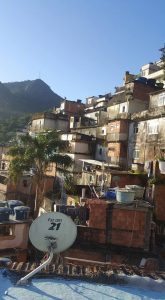 How Brazil’s Overflowing Penitentiaries could affect the Olympics by Niko
How Brazil’s Overflowing Penitentiaries could affect the Olympics by Niko
I’m looking down at my phone screen. There are two burnt bodies, the aftermath of a prison riot. I’m told one of them was a snitch, the other one was a prison officer, but they both look like a pile of ash and bones to me.
The guy that shows me this grisly footage, filmed by the prisoners themselves, Hugo, has been inside twice; the first time was for killing a man.
“In Brazil, every day there is a murder inside jail,” he tells me.
As Rio de Janeiro hosts the 2016 Olympics, one thing at the back of everyone’s minds is safety. The Marvellous City has an unfortunate reputation for crime that belies its golden beaches, beautiful women, stunning scenery and carefree carioca vibe.
This reputation is not entirely undeserved. Ever since the cocaine boom in the ‘80s, fighting between and within the city’s three major crime families – Red Command, Amigos dos Amigos and Pure Third Command – as well as corrupt police militias running mafia-style protection rackets, has contributed to Brazil having one of the worst homicide rates on the planet. One in every ten murder victims in the world is Brazilian, and around half of those cases are gang-related. Sometimes this has spilled over into a full-blown war against the state itself, with police helicopters getting shot down for straying into the wrong hood. And with murders and robberies both on the up over the last few months and even members of the German Olympic team getting caught up in a shootout, authorities are worried.
 Only on a few weeks before the start of the games, a dismembered body washed up on Copacabana Beach, near the Olympic volleyball venue. This comes mere days after over a dozen gunmen stormed a hospital where kingpin Nicolas Pereira Labre de Jesus aka ‘Fat Family’ was being held by police. Shots were fired, grenades were thrown and Fat Family escaped, leaving one civilian dead in the crossfire.
Only on a few weeks before the start of the games, a dismembered body washed up on Copacabana Beach, near the Olympic volleyball venue. This comes mere days after over a dozen gunmen stormed a hospital where kingpin Nicolas Pereira Labre de Jesus aka ‘Fat Family’ was being held by police. Shots were fired, grenades were thrown and Fat Family escaped, leaving one civilian dead in the crossfire.
Since the hospital where Fat Family was formerly handcuffed to his bed was meant to be a safe area for tourists, that raises some serious questions about the smooth running of the Games. But while ISIS have threatened to strike at the Olympics (following the November Paris attacks one ominous Tweet read “Brazil, you are our next target”), the biggest menace to Rio’s security comes from the gangs.
The last time Brazil held a major sports event, the 2014 World Cup, it was openly threatened. The country’s largest crime syndicate, the First Command of the Capital (Primeiro Comando da Capital, or PCC), warned of a “World Cup of Terror” if its leaders weren’t taken out of solitary.
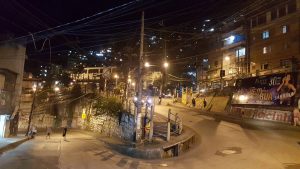 The PCC boys weren’t kidding: back in 2006 they’d laid siege to the city of São Paulo, killing over 120 people in the bloodiest terrorist attack Brazil has ever seen. Over the course of five days in May, gang members rampaged through the streets, shooting cops, bombing buildings and torching buses, while their comrades ran riot in prisons across the state. The reason? Authorities tried to transfer a group of imprisoned shot-callers to another facility.
The PCC boys weren’t kidding: back in 2006 they’d laid siege to the city of São Paulo, killing over 120 people in the bloodiest terrorist attack Brazil has ever seen. Over the course of five days in May, gang members rampaged through the streets, shooting cops, bombing buildings and torching buses, while their comrades ran riot in prisons across the state. The reason? Authorities tried to transfer a group of imprisoned shot-callers to another facility.
The PCC, which was ostensibly set up to fight for prisoner’s rights, draws its ranks from the cells of Brazil’s hellish penal system.
“Isis is cool. The only thing that’s the same is we’re all in jail so we can’t be with our families,” said Hugo, who served time with me at HMP Isis in London for armed robbery and drug trafficking, “But apart from that it’s completely different.”
Over a quarter of inmates in Brazil, which has the highest number of prisoners worldwide after Russia, China and the US, are doing time for drugs charges. Brazil’s in love with the coco, and being next to all three major coca-producing nations (Bolivia, Colombia and Peru) has helped create the second-biggest market for blow after the United States. While powder cocaine’s popular among the affluent middle-class, the situation’s got so out-of-control among the more marginalised sections of society that whole neighbourhoods known as Cracolândia or “Crackland” have sprung up across Rio, São Paulo and elsewhere. As well as the huge drugs market back home, Brazil is also a key transit point for cocaine bound for Europe, a lot of it going through West Africa where Nigerian gangs dominate the supply lines.
A new law was passed in 2006, attempting to differentiate between users and dealers. In theory, this was supposed to be a good thing: you’d no longer get locked up for smoking a joint. But the penalties for dealing got harsher, and what counted as ‘dealing’ was left for the judges and arresting officers to decide. In what has to be the case of the most hard-up drug dealer ever, one poor man got sent down for nearly five years for having 0.02g worth of weed.
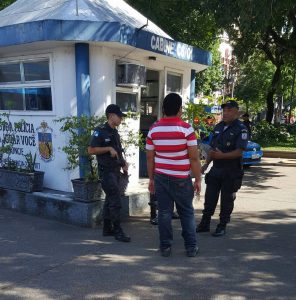 So owing to the stereotype that most favela residents are drug dealers, thieves and gang members, in the real world this meant that, as always, the rich get off with a warning while the poor get bent over and fisted by the long arm of the law. As a result, between 2006 and 2013 the number of drug convictions jumped 339%.
So owing to the stereotype that most favela residents are drug dealers, thieves and gang members, in the real world this meant that, as always, the rich get off with a warning while the poor get bent over and fisted by the long arm of the law. As a result, between 2006 and 2013 the number of drug convictions jumped 339%.
Brazil’s prisons are notoriously overcrowded, where inmates are left with zero privacy and diseases like scabies and tuberculosis spread fast.
“Brazilian jail is not clean,” explained Hugo, “We ain’t got no bed to sleep in, or there is only four beds but inside the cell there’s fuckin’ 24 people and shit. You ain’t got space for nothing.”
Imagine spending years on end with 23 other guys crammed in a four-man cell. At least you wouldn’t get lonely. But that too is a problem. In prison there’s not much choice for company, and it’s hard to not fall in with a bad crowd when everyone around you is hardly an upstanding member of society. And so thousands of young men and women thrown into the system for minor offences end up swelling the ranks of the underworld. It’s not like they have a choice – remaining unaffiliated will leave them at the mercy of the other prisoners or guards. Rape, torture and other brutality are an everyday occurrence behind bars.
As with the PCC, which has its power base in São Paulo, the gangs in Rio can trace their origins in prison as well. Red Command, for example, formed out of an alliance between bank robbers and left-wing militants thrown in together during the 1964-1985 military dictatorship. The guerrillas mixed with the common criminals, teaching them how to plan and execute raids with military precision, as well as their revolutionary ideology (which has since all but disappeared). Rival factions then split off to form Amigos dos Amigos and Third Command.
These days, the gangs use their influence behind bars to orchestrate deadly riots. One uprising in the northeastern state of Ceará back in May claimed 18 lives, with some corpses mangled so badly they could only be identified through DNA. The riots are largely an attempt to speak to the authorities in a language they can understand.
 “They want there to be change,” Hugo told me, “we ain’t got nothing to do; no workshops, we just stay in the cell. And every day the officers come and punch us and kick us, and that’s the reason why there are so many rebellions. In Brazil, you stay in your cell, you got your phone and you smoke weed and you go out twice a month for a visit, and that’s it.”
“They want there to be change,” Hugo told me, “we ain’t got nothing to do; no workshops, we just stay in the cell. And every day the officers come and punch us and kick us, and that’s the reason why there are so many rebellions. In Brazil, you stay in your cell, you got your phone and you smoke weed and you go out twice a month for a visit, and that’s it.”
So while British prisoners might have to endure the uncompromising reality of challenging sudoku puzzles, there are at least some attempts at rehabilitation. In Brazil, the mentality is to lock-‘em-up and throw away the key. While given the horrific levels of violent crime some of that makes sense, considering how many Brazilian inmates are non-violent drug offenders you have to ask whether caging people en masse and separating them from their families is really the best solution to the problem.
Outside, the same kind of mentality prevails. The authorities’ response to Brazil’s crime wave has been brutal in a way that makes the problems behind #BlackLivesMatter look like a mild spot of bother. A popular saying, bandido bom é bandido morto (“the only good bandit is a dead bandit”), exemplifies the police approach to law enforcement as shown in movies like Elite Squad (if City of God is like Goodfellas, Elite Squad is Dirty Harry). In the five years between 2010 and 2015, cops in Rio alone killed 1,519 people, mostly young, black and poor. Of course, drastic times call for drastic measures: the officers on patrol in Rio often find themselves in a lot more danger than say, those at the Shrewsbury Flower Show. But many of these killings are extrajudicial executions. In 2014 a video was leaked to the press showing two policemen driving three teenage suspects out into the woods, one of whom was later found dead (another was let go, while the third was found with gunshot wounds but survived).
 One of the tactics the police use is pacification, wherein paramilitary units are mobilised en-masse to effectively mount an invasion of a favela to flush out the resident drug cartels. That can be easier said than done, since being informal settlements means that walking through the favela is like walking through a maze. It’s in these urban labyrinths that the gangs run their ‘smoke shops’, dealing hotspots where you can buy everything and anything. Since the favelas have a reputation akin to the seventh circle of Hell, middle-class cocaine aficionados too scared to go inside have to rely on runners, moped-riding teenagers who earn a small commission for each delivery.
One of the tactics the police use is pacification, wherein paramilitary units are mobilised en-masse to effectively mount an invasion of a favela to flush out the resident drug cartels. That can be easier said than done, since being informal settlements means that walking through the favela is like walking through a maze. It’s in these urban labyrinths that the gangs run their ‘smoke shops’, dealing hotspots where you can buy everything and anything. Since the favelas have a reputation akin to the seventh circle of Hell, middle-class cocaine aficionados too scared to go inside have to rely on runners, moped-riding teenagers who earn a small commission for each delivery.
Once a favela has been ‘pacified’ a permanent police presence can move in and the area is, at least officially, back under government control. In November 2011, officers from Rio’s elite BOPE unit took back Rocinha, the largest favela in the city then under the stewardship of king-of-the-hill Antônio Franciso Bonfim Lopes, aka ‘Nem’ of the Amigos dos Amigos gang. Nem maintained his own brand of law-and-order, and under his reign theft, rape and robbery were not tolerated.
Walking around Rocinha and spotting the heavily-armed, black-clad UPP (Unidade de Polícia Pacificadora, or Police Pacification Unit) officers, some of the locals told me they actually preferred Nem and his crew. The gangs might have been bad, they said, but the cops are even worse. The police aren’t from the area and go home every night, so they don’t care, but the gangsters at least more or less respected the community. But has it worked?
Well, yes and no. While the gun-toting young men have been cleared off the streets their smoke shops are still very much in operation. The drug trade has simply gone underground. And in some other cases, since only a fraction of Rio’s favelas have been pacified, when the cops roll in the gangs simply move somewhere else. However, since the area’s been declared ‘safe’, the locals have appreciated the extra infrastructure and investment that pacification brought to the hood. After pretending for decades they didn’t exist, the government’s finally started paying attention to the favelas.
So why is gang violence in Rio on the rise? And why now?
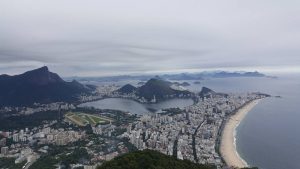 Maria lives in Quintino, an area far from the touristic South Zone and in her words, “not for gringos.” The neighbourhood is dominated by militias, corrupt cops who’ve chased out the drug traffickers only to start extorting the local population. But with the big event coming up, the cartels want to reassert their presence on the streets.
Maria lives in Quintino, an area far from the touristic South Zone and in her words, “not for gringos.” The neighbourhood is dominated by militias, corrupt cops who’ve chased out the drug traffickers only to start extorting the local population. But with the big event coming up, the cartels want to reassert their presence on the streets.
“Sometimes drug dealers want to take back the area,” she tells me, “and boom – you wake up to shooting.”
There have been several gun battles this year between militiamen and gangsters from the Morro do Dezoito part of the neighbourhood, a pattern that’s increasing throughout the city as traffickers take on the UPP. The violence has escalated as the Olympics draw closer; at least ten people have been killed in the manhunt for Fat Family as the government deploys an extra 27 battalions of military police.
Let’s not be too simplistic; Rio’s crime wave is due to a lot of things, not the least of which is the massive rich-poor divide. But the situation in prison and on the streets is closely tied. The authorities, following a militaristic approach to the war on drugs, lock up offenders by the thousands, helping consolidate the power of organised crime groups like Red Command or the PCC. Smuggled cellphones mean that their leaders reach extends far beyond the confines of their cell, and if the government tries cracking down on them now, they’ll be playing a very dangerous game. As the PCC showed, when drug dealers in Brazil get pushed, they push back. At some point, you have to question the logic of fighting fire with fire.
Names have been changed to protect identities.
If you liked this then read this by Niko .



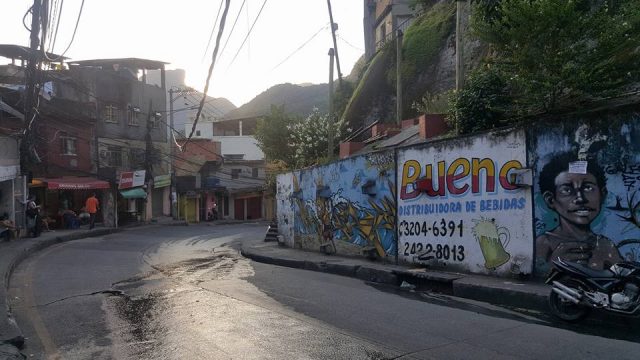
1 Comment
I am Brazzilian, i live in hood of São Paulo. This text is real, Brasil is dangerous. Just riches like Brasil